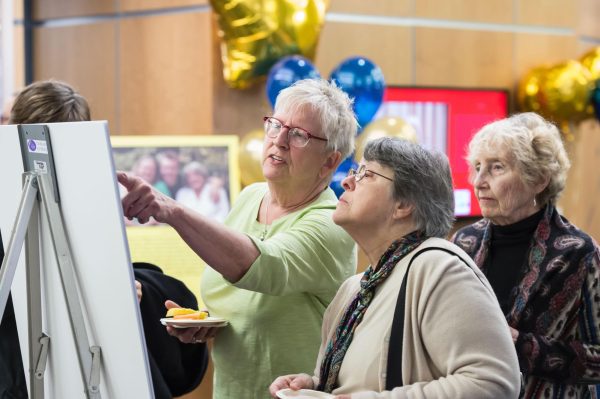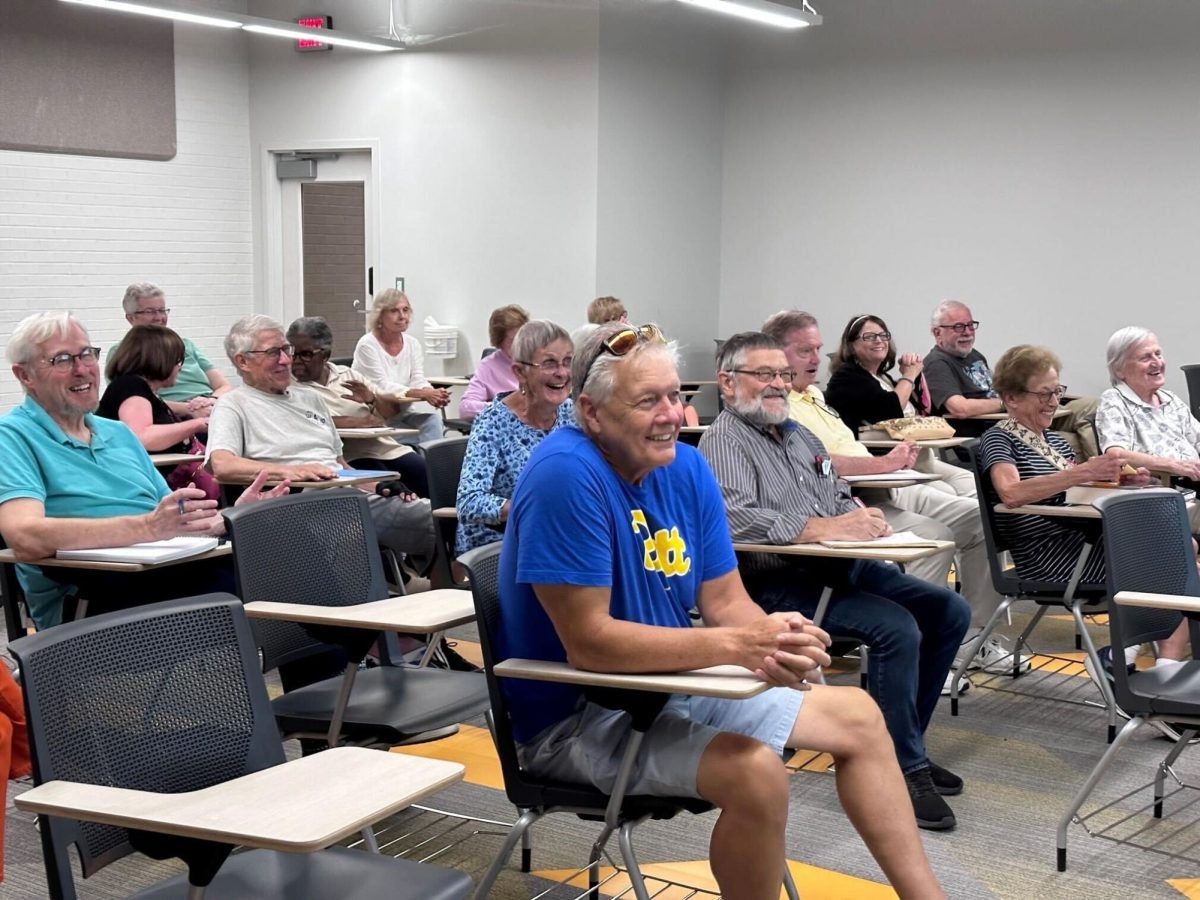Some people look forward to a life of relaxation after retirement without considering the extent of free time that comes with it.
One way to spend that newfound free time is through taking courses with Pitt’s Osher Lifelong Learning Institute (OLLI).
As a way for adults “50 years and better” to remain intellectually engaged, OLLI offers 5-week class programs on a multitude of topics, including art, history, literature, fitness, politics, religion and more. There are 10-week programs for more intensive topics that require full immersion, such as a language or yoga.
“There’s no credit, no tests, no homework,” Lisa Sharfstein, the director of OLLI at Pitt, said. “The people who join the program are really there because they love to learn. They’re excited about learning something new, they’re curious.”
Sharfstein said OLLI is located in all 50 states of the US, where each chapter is associated with a university. Pitt’s OLLI chapter offers opportunities that may not be found in other programs, such as auditing actual university undergraduate classes, according to Sharfstein.
“This is one of the ways that our OLLI is unique,” Sharfstein said. “Not all OLLI’s have that connection with their host university. Anywhere between 50-70 of our members are auditing undergraduate classes, but still not taking tests, writing papers or getting credits.”
Sharfstein said Pitt OLLI members receive access to Pitt’s libraries, the Pitt shuttle, Wi-Fi and a weekly newsletter with campus events.
“It’s really so great to be a part of campus, even though [OLLI] is a little separate from campus,” Sharfstein said. “Sometimes members can really participate, but sometimes they’re just there to sit back, listen and learn.”
The only requirement for membership is being older than 50 years old and paying a yearly fee of $250. Members don’t have to be Pitt alumni, but Sharfstein said some are. Retired Pitt faculty are also invited to participate and have the option to teach classes within the OLLI program.
“People don’t realize what a big transition it is to go from working full-time to being retired,” Sharfstein said. “Research shows that one of the aspects of healthy aging is keeping your mind active. Our program fills that need by providing an intellectually stimulating environment, but also, an opportunity to connect with other people.”

Larry Flatley, a Pitt alumni who studied history and political science during his undergraduate years, takes OLLI courses with his wife. Flatley said the program is a “really wonderful” outlet and way to spend his time after retiring from a “very high-stress” job.
“I couldn’t just shut off,” Flatley said, “I wasn’t ready to just lay around and do nothing — I wanted to be engaged. I had various things I was doing, and one of them was going to these classes.”
For people who live alone, Flatley said the OLLI program is a “great opportunity” to network with others and “learn new things.” Flatley explained how he prefers auditing classes over the 5-week courses offered by OLLI because they go “much more in-depth.”
“The best part about it is that I can sit in a classroom with a great professor who’s teaching a course, but also the students,” Flatley said. “I’ve learned a great amount from students, let’s say 20-year-olds, who have a completely different perspective about the world around me — as they should.”
Flatley has not only had the chance to learn in the classroom, but he’s also formed meaningful connections with teachers. Through OLLI, Flatley has had recurring professors from his time as an undergrad — specifically, Peter Carson of the history department.
“He had slides that he would have used 15 years earlier,” Flatley recalled. “That was really a treat. He’s a wonderful guy.”
Flatley explained the wide range of classes that OLLI offers. He said he’s taken “so many” courses that he can’t recall the exact number, but a few remain particularly salient in his mind, including a Beatles class.
“I was surrounded by 19, 20-year-olds. I was the only one old enough to remember The Beatles when they were actually The Beatles,” Flatley said. “The students, who are always very kind by the way, treated me like I was an ancient artifact from a long-gone era.”
Flatley said he’s grown close with Scott Smith, an instructor in Pitt’s History Department, who allows him to give guest lectures about the French and Indian War.
“It’s tremendously valuable,” Flatley said, “I’m getting back into research and the students seem really engaged with it.”
Nick Coles, a retired Pitt English professor, has the opportunity to take and teach classes through OLLI. He taught at Pitt for about 40 years and retired “3 years ago,” and has already completed about eight to nine classes.
“I found the thing that I missed most about my job was actually the teaching,” Coles said. “I like [OLLI] a lot. Compared to the work of constantly grading papers and stuff like that, it’s very enjoyable in terms of the relative ease with shorter courses and no grading.”
Coles taught a course titled “Literature and the Environment” during his time as a professor at Pitt. He continues to teach a modified version of this class through OLLI.
“What I’ve been able to do is take each of those courses and pare them down to a smaller format,” Coles said. “Really what I’m doing is revisiting courses that I used to teach.”
OLLI offers opportunities for its members to engage with younger students while also working with people in their “age bracket.” Coles said there are benefits of learning alongside both populations.
“I like working with folks around [20 years old], who are really sort of lively with projects and critically interested in the stuff,” Coles said. “At the same time, I like working with older folks who bring a lot of experience to the classrooms. Sometimes, they have very strong opinions that I enjoy arguing with.”
This upcoming semester, Coles is teaching a class called “Songs With a Message” for OLLI. He urges people to get involved with the program because he finds it important for people to remain intellectually stimulated as they age.
“The benefits are huge. It’s not easy when you’re my age, learning [new topics], you know, it’s a challenge,” Coles explains, “It keeps us sharp and curious. There is a huge need for community and when we can be together in the classroom, we can share this experience with others. You’ll be amazed at the range of stuff we can do.”


